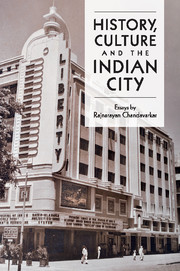Book contents
- Frontmatter
- Contents
- Acknowledgements
- Publisher's note
- Introduction by Dr Jennifer Davis, Wolfson College, University of Cambridge
- Bombay's perennial modernities
- Sewers
- Peasants and proletarians in Bombay city in the late nineteenth and early twentieth centuries
- State and society in colonial India
- Religion and nationalism in India
- From neighbourhood to nation: the rise and fall of the Left in Bombay's Girangaon in the twentieth century
- Historians and the nation
- Urban history and urban anthropology in South Asia
- Aspects of the historiography of labour in India
- Postscript by Professor David Washbrook, Trinity College, University of Cambridge
- Bibliography of the published works of Rajnarayan Chandavarkar
- Index
- References
State and society in colonial India
Published online by Cambridge University Press: 17 March 2010
- Frontmatter
- Contents
- Acknowledgements
- Publisher's note
- Introduction by Dr Jennifer Davis, Wolfson College, University of Cambridge
- Bombay's perennial modernities
- Sewers
- Peasants and proletarians in Bombay city in the late nineteenth and early twentieth centuries
- State and society in colonial India
- Religion and nationalism in India
- From neighbourhood to nation: the rise and fall of the Left in Bombay's Girangaon in the twentieth century
- Historians and the nation
- Urban history and urban anthropology in South Asia
- Aspects of the historiography of labour in India
- Postscript by Professor David Washbrook, Trinity College, University of Cambridge
- Bibliography of the published works of Rajnarayan Chandavarkar
- Index
- References
Summary
In Marx's famous phrase, the capitalist state was ‘the executive committee for the management of the common affairs of the whole bourgeoisie’. But it is by no means self-evident whose affairs were managed by the colonial state. The colonial state in India was neither the political crystallization of the social power of the dominant classes in India nor simply the instrument of metropolitan capitalists. Rather, its role throughout the colonial period rested upon the mediation of the infinite demands of metropolitan society and the political, social and economic constraints upon their realization in India. Ideally, therefore, an adequate history of the colonial state would have to integrate the changing imperatives of imperialism and the shifting interests of the metropolitan ruling classes, on the one hand, and the processes of social and political development in India, on the other. This paper pays homage to this ideal but it cannot aspire to its realization.
Whether British rule thwarted or fostered Indian economic development has been the subject of a long, largely inconclusive and generally sterile debate which has raged since the early nineteenth century between the proponents of British imperialism and their enemies. Nationalists placed the blame for the impoverishment of India squarely on the effects of British rule. Imperial proconsuls, on the other hand, claimed to have rescued India from primeval Asiatic stagnation.
- Type
- Chapter
- Information
- History, Culture and the Indian City , pp. 83 - 102Publisher: Cambridge University PressPrint publication year: 2009



